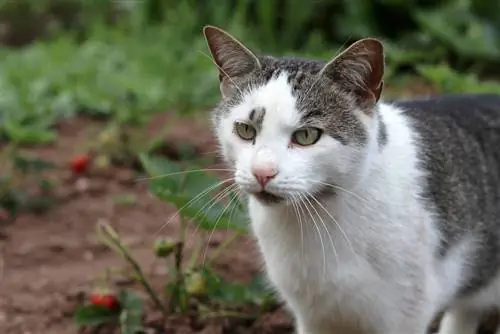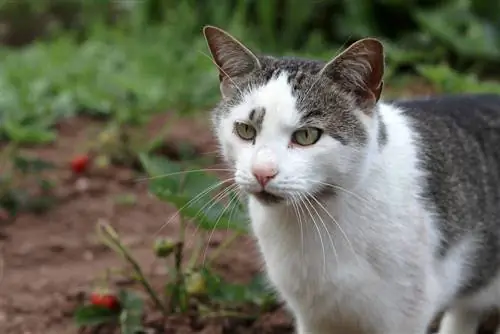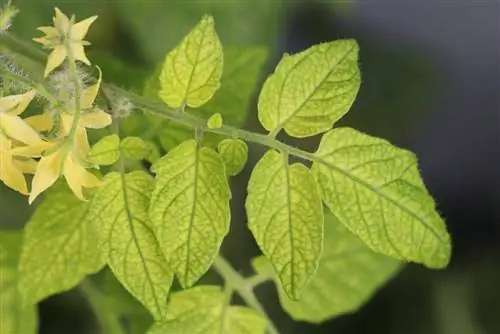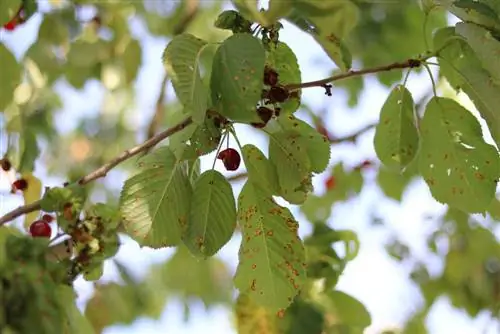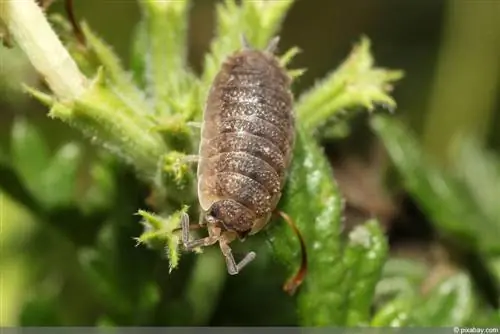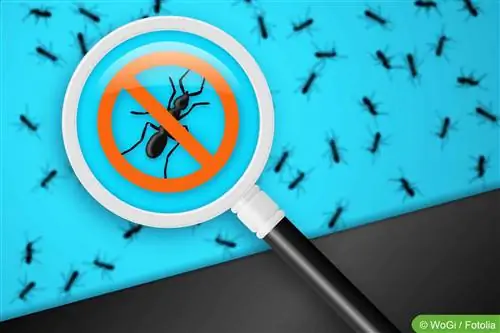- Author admin caroline@plants-knowledge.com.
- Public 2023-12-17 03:39.
- Last modified 2025-01-24 12:45.
Cats are among the most popular pets, but they are not always welcome in your own garden. If you want to keep the velvet paws away from your home, you might be thinking primarily about a cat deterrent. However, there are also much cheaper alternatives, as a number of home remedies have also proven to be effective against cats. Below you will find a list of various home remedies and how they work.
Repel cats with water
Most cats are averse to water and are downright afraid of water. It is precisely this fear of cool water that hobby gardeners can take advantage of to keep unwanted velvet paws out of the garden. There are different methods available for this:
Water gun
If you are often haunted by cats and regularly catch them in the act, you are well advised to use a water gun. Of course, this should be a conventional spray gun and not a water pump gun with a pressure booster. The goal is not to hurt the cat, but rather to scare it and keep it away.
- Advantage: mostly effective
- Disadvantage: requires presence
Tip:
It can happen that the cat cannot be kept away with a splash of water. This requires some patience and repeating several times.
Water bottles
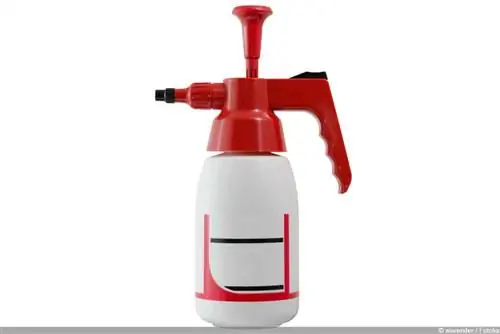
An alternative to the water gun is a water bottle, which can be used in two ways. On the one hand, it can be filled with water and then left open. With a bit of luck, the cat will knock it over as it passes by, scaring it. Alternatively, the bottle can be filled with water and then placed in the selected area. Because many cats are afraid of reflections, which is why a CD is also suitable for keeping cats away.
- Advantage: cost-effective
- Disadvantage: not always effective
Repelling cats with smells
Cats have a highly developed sense of smell and around three times as many olfactory cells as humans. The sense of smell helps furry friends, among other things, with orientation and recognizing other animals. If you want to drive the velvet paws out of the garden, you can use their sense of smell. Because cats don't like a lot of rumors and avoid them accordingly.
Pepper and chili
Hot smells like pepper and chili are far too strong for the cat's nose. The smell of onions, ginger and garlic has also been shown to be effective against cats. As a rule, even the smallest amounts are enough to keep the velvet paws away from the bed. However, it should be noted that the effect is lost with the next rain. If you have a sandpit in your garden, you can simply mix in ground pepper or chili.
- Advantage: Almost everyone has pepper and the like at home
- Disadvantage: Effect does not last long
Citrus scents
The smell of lemons and oranges is particularly intense and is usually perceived as too strong by cats. If you want to keep the velvet paws away with citrus scents, you can distribute sliced oranges or lemons in the bed. Grated orange or lemon peels and essential oils with a citrus scent are also suitable. However, it should be noted that the effect does not last long outdoors. Alternatively, you can of course plant a citrus plant in the garden.
- Advantage: cost-effective
- Disadvantage: only has a limited effect outdoors
Vinegar
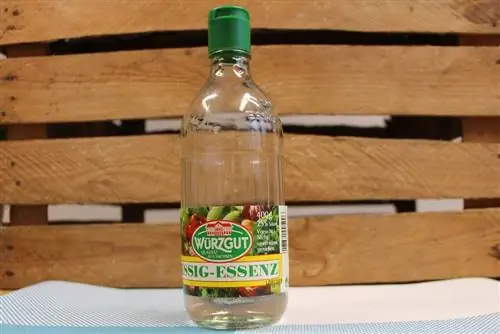
Vinegar has the same effect as citrus scents and is generally avoided by cats. The same applies to the disadvantages, because the smell of vinegar also dissipates relatively quickly outdoors. However, vinegar also has a high acid content, which could harm the plants in the bed. If you want to use vinegar in the garden, you should do so primarily on the patio area.
- Advantage: very effective
- Disadvantage: can damage plants and soil
Cinnamon
Many people find the smell of cinnamon particularly pleasant. With cats, however, the opposite is usually the case because the velvet paws avoid the spicy smell. If you want to keep the furry friends away with cinnamon, simply place a few cinnamon sticks in the appropriate places. Don't forget: The scent disappears relatively quickly outdoors and the cinnamon sticks have to be re-laid out after the next rain at the latest.
- Advantage: pleasant smell
- Disadvantage: Only limited effect outdoors
Cloves or clove oil
The smell of cloves has also been proven to be effective against cats. To do this, whole cloves are simply inserted into the substrate, just as is done with fertilizer sticks. Alternatively, some clove oil can be mixed into the irrigation water and the affected areas can be irrigated with it.
- Advantage: also keeps ants away
- Disadvantage: toxic to cats in large quantities
Mint oil
Mint also smells too strong for many cats, which is why they tend to avoid such areas. To keep the furry friends away with mint oil, all you have to do is mix a few drops into the water. The relevant areas are then watered with the mixture. The same applies here: after rain, the mixture must be reapplied.
- Advantage: pleasant smell
- Disadvantage: only partially effective outdoors
Banana peels
Most people don't perceive the smell of banana peels as particularly strong. The situation is different with cats, because the smell of bananas is too strong for them. It is therefore worth not disposing of the banana peels in the compost, but rather laying them out in the bed. It is best to place them under ornamental foliage perennials, as this means they are least noticeable.
- Advantage: suitable as fertilizer
- Disadvantage: can look ugly
Tip:
Banana peels can also be dried and stored. It is important that the bowls are not stored in closed containers, otherwise there is a risk of mold.
Coffee grounds
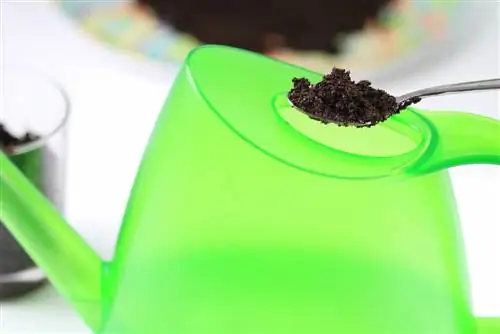
Coffee grounds are a natural fertilizer for many hobby gardeners, but they also keep cats away. But it's not just velvet paws that avoid this smell, as ants and snails also avoid coffee grounds. However, those who enjoy the home remedy are earthworms, because they are literally attracted to it. This in turn is beneficial for the plants in the bed because earthworms loosen the soil.
- Advantage: natural fertilizer
- Disadvantage: only suitable for coffee drinkers
Tip:
Cats don't like coffee grounds either dry or wet.
More home remedies to keep cats away
You don't always have to raid the kitchen to find effective home remedies for cats. Because certain plants and care work can also ensure that the velvet paws avoid your own garden.
Fuck off plant
Behind the piss-you plant there is nothing other than the harbor bush. The plant is relatively small with a height of around 40 centimeters, but extremely effective against cats. The nettles of the harbor bush contain essential oils such as menthol. Most cats find these annoying, which is why they avoid the area around the harbor bush.
- Advantage: Plant is clear
- Disadvantage: usually requires several plants
Mulching
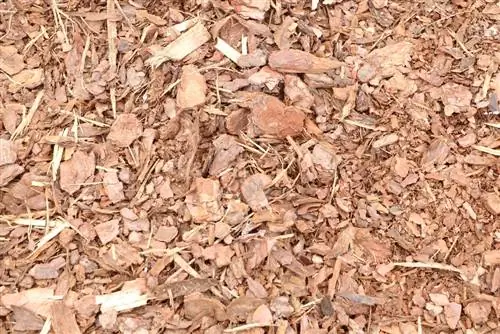
Mulching is an integral part of the care routine for most hobby gardeners. Mulching not only helps regulate the temperature of the soil, but also reduces the loss of moisture from the soil. On top of that, the mulch layer supplies the plants with important nutrients and at the same time inhibits weeds. Nice side effect: bark mulch also keeps many cats away.
- Advantage: long-lasting, organic fertilizer
- Disadvantage: can attract snails
Cat food
Putting out cat food may sound misleading at first, but the four-legged friends are more likely to be attracted to the food than scared away. However, if you are constantly annoyed by cat excrement in the flower bed, cat food is a good idea. As a rule, cats keep their feeding places clean and do not defecate there.
- Advantage: effective against cat excrement
- Disadvantage: is more suitable for cat owners

